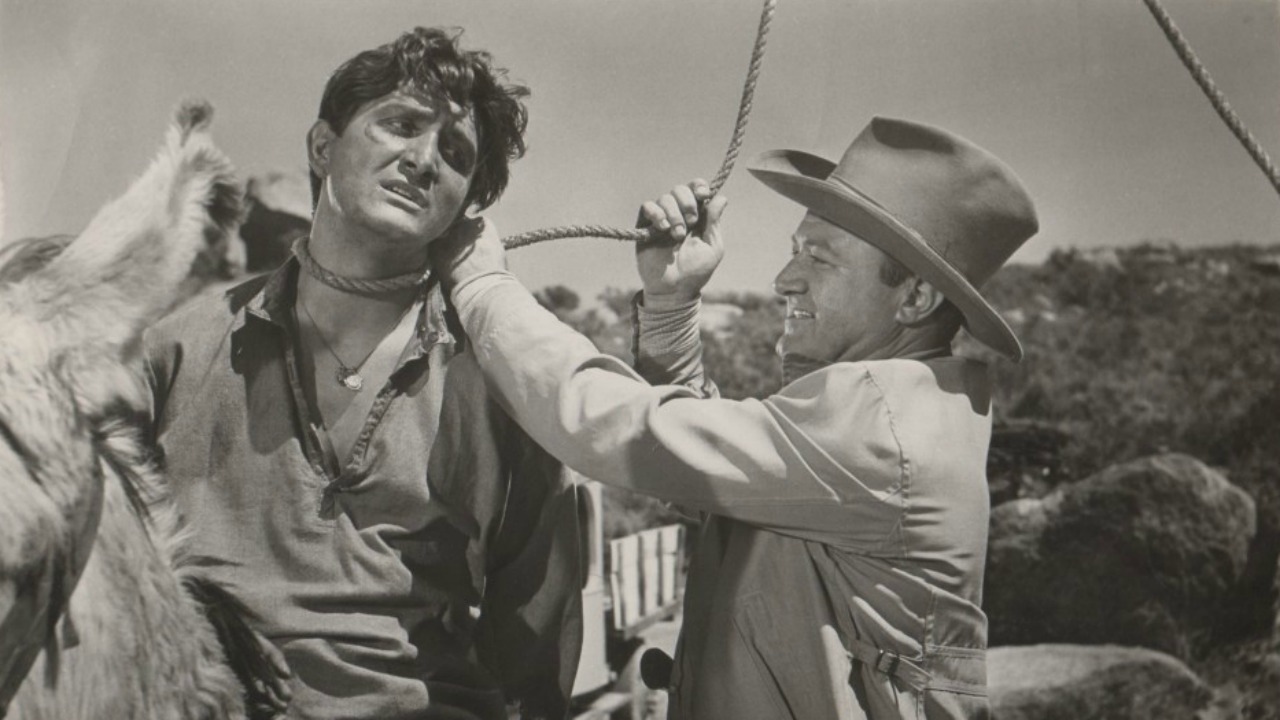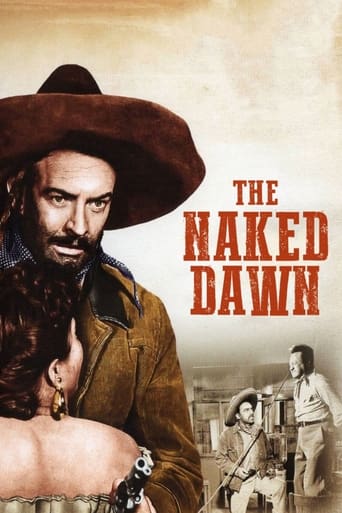

the leading man is my tpye
... View MoreCaptivating movie !
... View MoreEntertaining from beginning to end, it maintains the spirit of the franchise while establishing it's own seal with a fun cast
... View MoreIf the ambition is to provide two hours of instantly forgettable, popcorn-munching escapism, it succeeds.
... View MoreThe movie's not a western in the usual sense. Instead, it's more like a pondering of character and life-styles set in modern Mexico. Manuel and Maria are in an arranged marriage, she being passed along like a piece of property, he being a budding farm entrepreneur. They are above all "respectable", and the feeling is that this is what holds the marriage together. Then, into their settled life arrives escaping train robber Santiago. But he's not a typical robber. We know that from his buddy's moving death scene. There Santiago shows something of a poetic sensitivity, proving he's not without his own sense of values. In fact, he's more a free spirit than a criminal type, even giving away much of his loot to deserving strangers. Ironically, however, he appears unfree to be anything but free! It's Santiago's free-wheeling effect on the young couple's brittle marriage that makes up the storyline. Kennedy, of course, was one of that era's premier actors. Here, his bravura performance effectively dramatizes Santiago's free spirit gusto. On the other hand, as the young couple, Iglesias and St. John appear over-the-top at times. Perhaps that can be rationalized by their emotional release from repressed lives. Nevertheless, the emoting does at times distract from story advancement.The notion of respectability is also pondered here. What the screenplay seems to be saying is that conforming lives are okay as long as one's humanity is not sacrificed in the process. In his own eccentric way, this appears the lesson Santiago imparts to the young couple. At the same time, religion gets much the same treatment, while criminal Santiago acts poetically as a kind of secular priest in easing his dying confederate into the great unknown.All in all, the movie's distinctive features come more from blacklisted writer Zimet's offbeat screenplay than from cult director Ulmer who's required to film in Technicolor instead of his b&w forte. Nonetheless, the movie's fully deserving of the Ulmer brand-- an offbeat 80-minutes that manages some depth over and above its tacky 50's title.
... View MoreSantiago (Arthur Kennedy) is a good-hearted bandit...if there actually is such a thing. And when he meets up with Manuel and his wife, he leads the very meek Manuel into life on the wild side. While Manuel has always been very righteous, soon he starts to enjoy the idea of wealth and soon his true, violent and selfish side comes out after making this new friendship. But he's not the only one affected by Santiago's arrival...as soon Manuel's wife, Maria, has fallen for this new mystery man! What's to come of all this?While this could have been a nice little morality tale about greed, it suffers in several ways. Its pacing is not great and has some slow moments or scenes that could have been excised. At times, the Mexicans seemed awfully silly and stereotypical. Also, occasionally the acting is a bit overwrought...though I must admit that I was surprised that Kennedy was actually pretty good in the lead...playing the Bandito.
... View MoreThis is an odd film. Not just because it was directed by Edgar G. Ullmer or because it's about Mexicans, but because of the absence of the usual stereotypes -- the guilty hitchhiker, the savage woman -- whose characters never change, or change only under the force of circumstances. Arthur Kennedy, finally in a lead role, is a kind of fatalistic bandido. His partner in a train robbery is mortally wounded and Kennedy comforts him cheerfully with visions of the paradise to come. Then he meets a younger, married couple -- Betta St. John and Eugene Iglesias. The wife is seen carrying some water to the small farm nearby and is a bit charmed with the glistening white smile that Kennedy's make up throws into prominence, and with his perception. We meet Iglesias, the handsome husband, nineteen years old, bare chested, digging away at a hole to find a well. If the films of the 1950s ever had a set up for a stereotypical happy marriage between peasants, this is it. St. John and Iglesias should be deeply in love, tender with each other, hard-working, honest helpmates. Maybe the Dionysian Kennedy will seduce the wife, leading to a physical confrontation, or at any rate a moral one, that Kennedy will lose. But no. St. John confesses that she grew up on a hacienda where the boss and his family treated her as a whore and that she was part of the bargain when the patron sold this bit of land to Iglesias. They've been married for less than a year and were strangers to one another. They still are in some respects. Iglesias, on his part, orders her around like a servant, knocks her about, and shows her no affection but, as she says, it's better to be a servant in one's own home. There's another feature of this color Western that should be mentioned. There's the usual stilted writing we always associated with the natives in early films. "Si, we wheel prosper, if the good God permits." "You take the bed. I wheel slip on the floor." That sort of thing. But the dialog has moments when it scintillates with authenticity. The writers know that some tortillas are better than others, and they're entirely right. Few things beat a fresh, warm tortilla with a pat of butter. Iglesias praises the home-made pulque and describes its being sucked from the green cactus lined up like little soldiers in their green uniforms. And the pulque itself looks like milk. The production design and set dressing are exceptional too, if maybe a bit more colorful than the real thing. So is wardrobe, except for St. John's stylish faux Latin blouse and skirt. (She resembles Teresa Wright only less -- innocent.) The men are dressed like the poor people they are, with baggy pants and hats that are made of ragged straw or are beat-up sombreros.The characters are subject to sudden shifts of mood. Kennedy is capable of sudden outbursts of momentary anger for small reason. And the innocent young farmer, for instance, is swept up in an altercation between Kennedy and a man who tries to cheat him. He's scared to death but does his part, and later he and Kennedy get joyously drunk together. A few hours later, Iglesias starts thinking about the things he could do with the farm if only he had all the loot that Kennedy is carrying around with him. So he hides a pistola under his serape and steals outside to shoot and kill the sleeping Kennedy, while promising God he will help build the new altar. The anticipated good guy and bad guy are the reverse of the initial set up. These metamorphoses are reasonable enough. Who can tell with certainty what an acquaintance will do or say next? We're all part devil and part angel. And the loving wife? She begs Kennedy to take her with him when he's about to leave, not because she loves him and his pheromones but because she hates the farm and her husband. I just don't know whether these conversions are deliberate, in which case I applaud them, or whether they're just examples of sloppy plotting.None of the performances are outstanding, and one of them, Iglesias', is downright crummy. Ulmer's direction is competent, nothing more. But the script is edgy enough to keep a viewer involved until the inevitable shoot out which, consistent with the rest of the film, isn't exactly what you'd expect.
... View MoreThis movie provides the viewer with an opportunity to see a truly gifted,if unsung actor, in a role that he owns. Arthur Kennedy played many supporting roles in the 40's and 50's and was nominated five times for an Oscar as Best Supporting Actor. During that time he acted for most of the outstanding directors of the period and with actors like Mitchum,Sinatra,Douglas,to name a few. Long overdue for a memorable starring role, he finally has the lead in this movie. As Santiago he demonstrates how callousness and gentleness of spirit can reside believably in the same person. His contact with th peasant couple ultimately changes forever their views of the future as well as his own and final redemption. This is a movie one can see only on TV late shows. A pity, but if you're lucky enough to catch it, you'll be rewarded. Guaranteed.
... View More